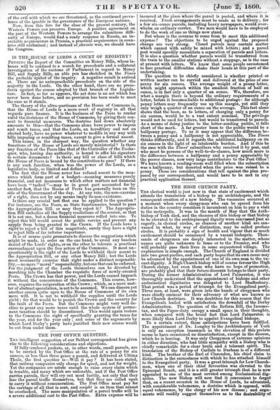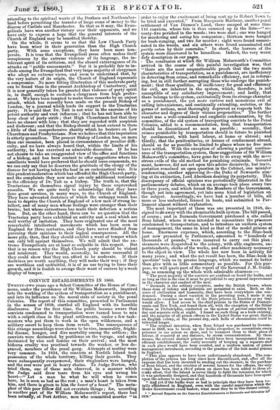THE HIGH CHURCH PARTY.
THE clerical world is just now in that state of excitement which attends the translation of a bishop to an archbishoprio, and the consequent creation of a new bishop. The vacancies occurred at a moment when every clergyman who can be spared from his duties in the country considers it incumbent on him to pay a visit to the metropolis. It was in the month of May that the Arch- bishop of York died, and the chances of this bishop or that bishop to be elevated to the archiepiscopal dignity were canvatned lent as eagerly, in clerical circles, as chances of another kind are can- vassed in what, by way of distinction, may be called profane circles. It is probably a sip of health and vigour that so much excitement should be occasioned by a vacant bishopric. Thou- sands of clergymen are deeply interested in the matter, whose names are quite unknown to fame or to the Premier, and who
will probably pass their lives in some sequestered village. The explanation is simple enough. The Church of England is divided into two great parties, and each party hopes that its own cause may be advanced by the appointment of one of its own men to the va- cant dignity. A High Church bishop will of course favour the High Church clergy, but even those who have no hope of promotion, are probably glad that their future diocesan belongs to their party. During the former Administration of Lord Palmerston, it was thoroughly understood that the appointment of bishops and other ecclesiastical dignitaries was delegated to Lord Shaftesbury. That period was a period of triumph for the Evangelical party. Three sees at least, were given into the hands of clergy men who were chiefly embient for their advocacy of what are known as Low Church doctrines. It was doubtless for this reason that the Evangelicals hailed with satisfaction the downfall of the Derby Administration. The question of the Reform Bill, the Income- tax, and the Paper-duty occupy a small space in their thoughts, when compared with the broad fact that Lord Palmerston is more likely than Lord Derby to appoint Evangelical bishops. To a certain extent, these anticipations have been fulfilled. The appointment of Dr. Longley to the Archbishopric of York is only an exception inasmuch as the elevation of this prelate seems to have occasioned no dissatisfaction, except in the diocese, which he is leaving. It was only Clergymen of extreme opinions in either direction, who had little sympathy with a Bishop who is chiefly remarkable for a clear brain and a tolerant spirit. The translation of the Bishop of Carlisle to Durham is of a different kind. The brother of the Earl of Clarendon his chief claim to i
dtinction is the earnestness with which he has attached himself to the Evangelical party. It was a great triumph for Low Church- men, when one of their chief favourites was elevated to the Episcopal Bench, and it is a still greater triumph that he is now appointed to one of the most coveted among Ecclesiastical dig- nities. The new Bishop will now find it convenient to forget that, on a recent occasion in the House of Lords, he advocated, with considerable vehemence, a doctrine which is opposed, with equal vehemence, by the clergy of his new diocese ; and argu- ments will readily suggest themselves as to the desirability of
attending to the spiritual wants of the Durham and Northumber- land before permitting the transfer of large sums of money to the diocese of Carlisle and Manchester. Be that as it may, the Evan- gelicals have won another victory over their opponents, and we have only to express a hope that the general interests of the Church of England may be benefited thereby. On the whole, it seems to us that the Low Church Party have been wiser in their generation than the High Church party. With some exceptions, they have been more tem- perate. It is true that the Evangelical press often makes itself conspicuous by the extreme violence• of its language, the in- tolerant spirit of its criticism, and the absurd extravagance of its
attacks ! public amusements." But it is probably fair to in- clude among the-Evangelical that very large majority of clergymen who adopt no extreme views, and seem to understand that, by the very nature of- its origin, the Church of England represents a compromise. No snore fitting illustration of this moderate party can be found than in the present Archbishop of Canterbury, and it is now generally taken for granted that violence of party spirit is, in itself, enough to exclude a clergyman from high prefer- ment. We have been tempted to make these remarks by an unjust attack, which has recently been made on the present Bishop of London, by a journal which lends its support to the Tractanan party. his said that Dr. Tait is not wise in the exercise of his potent authority and vast influence; that he has not been able to keep clear of party strife; that High Churchmen feel that they have no chance with him ; that they are- regarded with suspicion and disfavour ; and that-the Bishop should at least extend to them a little of that comprehensive eharity which he bestows on Low Churchmen and Presbyterians. Now we believe that this imputation is utterly groundless. The present Bishop of London has, on more than one occasion, been placed in circumstances of peculiar diffi- culty, and we have always heard that, within the limits of his authority, he has exercised an admirable discretion. If he has not chosen to take an exaggerated view of the office and functions of a bishop, and- has been content to offer suggestions where his assailants would have preferred that-he should issue commands we we can only say that he deserves the gratitude of the clergy of diocese for not having taken the lead in an ecclesiastical war. It is this prudent moderation which has offended the High Church party, and the complaints they now make are only additional testimony to the efficiency of Dr. Tait as a bishop. The truth is, that the Tractarians do themselves signal injury by these unprovoked assaults. We are quite ready to acknowledge that they have done .great services, in many ways, to the Church of England. They have advocated doctrines of which the unhappy result has been to deprive the Church of England of a few men of strong in- tellect, and of many men whose feelings were stronger than their brains, but whose earnestness has made their defection a serious loss. But, on the other hand, there can be no question that the Tractarian party have exhibited an activity and a zeal which are well worthy of imitation. They have originated one of the most remarkable intellectual movements which has been seen in England for three centuries, and they have never flinched from pursuing their opinions to their logical consequences. All the more pity, then, that they should exhibit a want of temper which can only tell against themselves. We will admit that the ex- treme Evangelicals are at least as culpable in this respect. But that is no reason why.the High Church party should be violent and intolerant. They would, assuredly, be more successful if they could show that they can afford to be moderate. If their doctrines are worth anything, they will make their way ; if they are worthless and unfruitful, it is of no use trying to force their growth, and it is foolish to avenge their want of success by a weak display of temper.



























 Previous page
Previous page